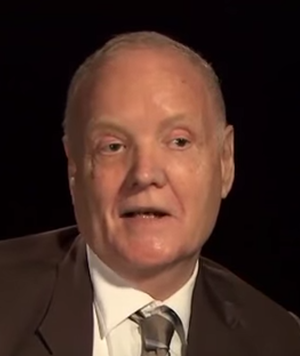Lester Thurow
( economist) | |
|---|---|
 | |
| Born | May 7, 1938 Livingston, Montana |
| Died | March 25, 2016 (Age 77) |
| Nationality | US |
| Alma mater | • Williams College • Balliol College(Oxford) • Harvard University |
| Member of | Rhodes Scholar/1960 |
US political economist and supporter of governmental involvement in the direction of the economy who attended Bilderberg/1977. | |
Lester Carl Thurow was an American political economist, former dean of the MIT Sloan School of Management, and author of several bestselling specialist books, which mainly deal with complex issues of economic developments in the major economic areas of America, Europe, Japan and China. In addition to writing his widely read books, he advised presidential candidates and maintained a decades-long dialogue with policymakers.[1]
Thurow was a longtime advocate of a political and economic system of the Japanese and European type, in which governmental involvement in the direction of the economy is far more extensive than is the case in the United States – a model that has come to be known as "Third Way" philosophy. He attended the 1977 Bilderberg meeting, where one of the topics was North American and Western European attitudes towards the future of the mixed economies in the Western democracies.
Education
Born in Livingston, Montana, Thurow received his B.A. in political economy from Williams College in 1960, where he was in Theta Delta Chi and Phi Beta Kappa as a junior, and a Tyng Scholar. After he was awarded a Rhodes Scholarship, he went to Balliol College, Oxford to read Philosophy, Politics and Economics, graduating in 1962 with first class honors. He received a Ph.D. in Economics from Harvard University in 1964.[2]
Career
Thurow was on the board of directors of Analog Devices, Grupo Casa Autrey, E-Trade, and Taiwan Semiconductor Manufacturing Corp. Thurow was one of the founders of the Economic Policy Institute in 1986. Thurow was an economics columnist for, among others, the Boston Globe and USA Today. He was an economics columnist for and on the editorial board of the New York Times, and was a contributing editor to Newsweek, where he received the 1982 Gerald Loeb Award for Columns/Editorials.[3]
Thurow was a longtime advocate of a political and economic system of the Japanese and European type, in which governmental involvement in the direction of the economy is far more extensive than is the case in the United States – a model that has come to be known as "Third Way" philosophy. Thurow supported a more universal patent system as a requirement for a knowledge-based economy, where governments would assess the value of infringements of intellectual property against their companies by competitors in foreign jurisdictions and allow these companies to match that.[2][4]
Thurow died at the age of 77 on March 25, 2016.[1][5]
Event Participated in
| Event | Start | End | Location(s) | Description |
|---|---|---|---|---|
| Bilderberg/1977 | 22 April 1977 | 24 April 1977 | Imperial Hotel Torquay UK | The 25th Bilderberg, held in Torquay, England. |
References
- ↑ Jump up to: a b https://news.mit.edu/2016/prominent-mit-economist-and-dean-lester-thurow-dies-78-0329
- ↑ Jump up to: a b https://web.archive.org/web/20110608063500/http://mitsloan.mit.edu/faculty/detail.php?in_spseqno=146&co_list=F
- ↑ https://www.anderson.ucla.edu/news-and-events/signature-events/gerald-loeb-awards/winners/historical-winners
- ↑ Wired Magazine – Interview and Description of Thurow's Patents Plan
- ↑ https://www.nytimes.com/2016/03/30/business/economy/lester-c-thurow-prominent-economist-is-dead-at-77.html
Wikipedia is not affiliated with Wikispooks. Original page source here